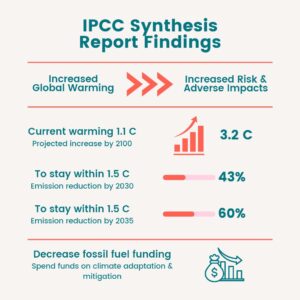Summary of the Findings
This IPCC Synthesis Report (SYR) is a summary of all reports of the IPCC’s 6th Assessment Cycle published between 2018 and 2023. The SYR included the landmark Global Warming of 1.5°C, the more recent reports demonstrating how anthropogenic greenhouse gases are causing unprecedented damage, and the report demonstrating that at current levels, many parts of the planet will become unliveable in the next few decades.
The viability of humanity living within planetary boundaries rests on the actions we take in the next seven years. There’s no time to lose to keep to the target of limiting the global average temperature to below 1.5°C.
“There is a rapidly closing window of opportunity to secure a liveable and sustainable future for all.”
Here are some of the main findings:
- Human-caused climate change is already affecting many weather and climate extremes in every region across the globe – with widespread loss and damage to both nature and people.
- GHG emissions will lead to increasing global warming in the near term, and it’s likely this will reach 1.5°C between 2030 and 2035.
- We are currently at around 1.1°C of warming and current climate policies are projected to increase global warming by 3.2°C by 2100.
- The IPCC has “very high confidence” that the risks and adverse impacts from climate change will escalate with increasing global warming.
- To keep within the 1.5°C limit, emissions need to be reduced by at least 43% by 2030 compared to 2019 levels, and at least 60% by 2035. This is the decisive decade to make that happen.
- Losses and damages will disproportionately affect the poorest and most vulnerable populations, particularly those in Africa and least-developed countries, creating more poverty.
- Prioritizing equity, social justice, inclusion and just transition processes will enable ambitious climate mitigation actions and climate-resilient development.
- Tracked climate finance for mitigation falls short of the levels needed to limit warming to below 2°C or to 1.5°C across all sectors and regions.
- Public and private finance flows for fossil fuels are still greater than those for climate adaptation and mitigation.
- Among other measures to ensure energy systems are net-zero CO2 emitters, we need a “substantial reduction in overall fossil fuel use, minimal use of unabated fossil fuels, and use of carbon capture and storage in the remaining fossil fuel systems; energy conservation and efficiency; and greater integration across the energy system”.

Read more about what GTEC is doing to inform, support and activate the community in responding to the climate crisis with our Climate Response Centre project and the development of our Community-based Collaborative Model.

